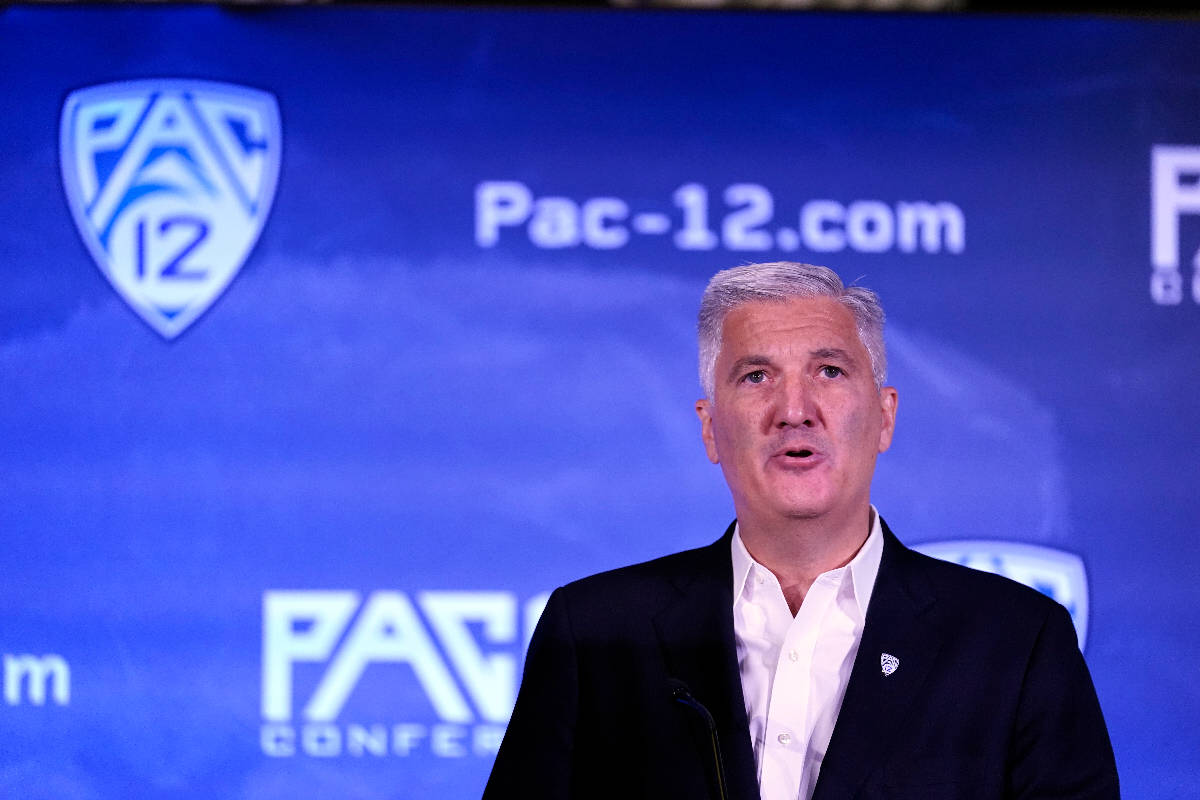Pac-12 open to possible expansion, new commissioner says
Much has changed in college athletics since the Pac-12 Conference announced in May it was hiring MGM Resorts executive George Kliavkoff as its new commissioner.
Texas and Oklahoma are eventually headed to the Southeastern Conference, and athletes are able to profit off their name, image and likeness. And more change is on the way.
Kliavkoff spoke Thursday about the issues facing college athletics and the role he sees for Las Vegas as those issues are resolved. The following was edited for clarity and length:
Review-Journal: Is there anything you can tell us about realignment and its impact on the Pac-12?
Kliavkoff: “I think we’re really, really happy with the 12 that we have in the league. The opportunity to revisit that following Texas and Oklahoma has certainly presented itself. I am not actively poaching any school or convincing anyone to leave their existing conference, but I wouldn’t be doing my job if I wasn’t listening to schools that wanted to go in the Pac-12, and we’ve had a lot of them reach out. Probably all of the ones you would expect and several you’d be surprised by.
“We have taken initial meetings with everyone that has expressed an interest. We have a working group … who are together deciding on what to recommend … At the end of the day, they’ll make the decision about whether or not to offer admission to the Pac-12 to any other schools.”
Review-Journal: Do you have a deadline?
Kliavkoff: “There’s no hard deadline related to any of this, but I would say I don’t think it’s good for college athletics given the vibration that’s going on as a result of the Texas and Oklahoma news. The quicker we can dampen that vibration, the better. We will have a decision on whether we intend to expand or not in the next couple of weeks.”
Review-Journal: With your background at MGM, what sort of ideas to do you bring to college athletics?
Kliavkoff: “I think being at MGM and overseeing venues and the events that I was responsible for helps me to understand what it takes to put on a great experience for viewers and fans. I think that replicates itself in my job in the Pac-12. We’re constantly thinking about how to make better matchups, make it a better experience for the fans who are attending our games, and to elevate the experience and create new events and new content that doesn’t currently exist.
“The second thing I think I learned really well at MGM was taking care of the athletes, singers and performers who were part of our entertainment experience at MGM. For me, that means taking care of our student-athletes and doing everything we can to support them.”
Review-Journal: Where do you see college athletics in five years?
Kliavkoff: “I think five years from now it’s likely to look a lot like it looks today, with some exceptions at the margins. I think all of the talk about super conferences and the reclassification of some of the existing conferences is not necessarily going to happen.”
Review-Journal: That could surprise some people.
Kliavkoff: “If you ask me about 10 or 20 years from now, it may be different, but it seems like a lot of what drives this are the media-rights deals. In the next three to four years, three of the Power Five conferences are going to renegotiate those deals, but I think the membership of those conferences are going to look a lot like they do today.”
Review-Journal: How do the various platforms such a streaming and cable affect negotiating media-rights deals?
Kliavkoff: “Our media rights come up for negotiation in three years. Unlike the other Power Five conferences, we own 100 percent of our rights and 100 percent of our linear cable network. I think the backward trends in media are actually operating in our favor. Every year, there are more consumers facing media-bundled services than ever. I think live sports are more valuable than ever.
“They appeal to a great demographic. Particularly Pac-12 alumni and fans are off-the-charts valuable demographics. And they’re the only DVR-proof content, making it more valuable for advertisers. I think when you balance all of that, we’re going to have multiple bidders when our rights come up for renegotiation.
“Since we have the only Power Five teams in the Mountain and Pacific time zones, when we play a night game, we get paid handsomely for doing that because we’re filling a time slot no other Power Five conference can fill. Our audience is limited compared to a nationally televised game because a lot of the East Coast is already asleep or will be asleep by halftime.
“You also have AP voters and Heisman candidate voters who may not be able to see all of that game. So we’re getting paid more for that game, but it costs us in national exposure and perhaps a competitive advantage for getting into the (College Football Playoff). We’re going to have to balance all of that, but all media-rights negotiation is a balancing act.”
Review-Journal: How do you see the Pac-12’s future with Las Vegas?
Kliavkoff: “I think we’ve had an incredible experience with men’s and women’s basketball tournaments. I’m probably in a difficult place to say that because I was sitting on the other side of the table when those deals were done, so it’s kind of like patting myself on the back. But I actually think if you ask people across the Pac-12 … they would tell you how happy they were with those events.
“I think we’ll see a similar reaction when we start our initial two-year run of football championships at Allegiant Stadium on Dec. 3. … The pre-public ticket sales were off-the-charts good for us, and I think our fans love the idea coming to Vegas for an event like that, but then surrounding it with everything that Vegas has to offer. My guess is long term I hope to be doing more with Vegas rather than less.”
Review-Journal: Do you have any specifics in mind?
Kliavkoff: “I don’t have anything to announce.”
Review-Journal: Sports betting is becoming more accepted. How do you see that evolving?
Kliavkoff: “When I was sitting on the board at Bet MGM a couple of months ago and became quite educated in the space, I looked the projections … and it’s projected to be a $25 billion or $30 billion legalized sports betting business by 2025. Then I realized the estimate from the illegal sports betting market today is $150 billion. I’d rather be operating in states where it’s legalized, legislated and taxed and where some of the money that’s raised from that venture goes to protecting the integrity of the game and protecting our student-athletes. But I think that’s a decision that will be left to each of the individual institutions.”
Review-Journal: How do you see Las Vegas moving forward as a sports town?
Kliavkoff: “Everything about sports in Vegas has outperformed what every expert thought. We’ve always been a capital for things like championship boxing and similar sports, but the introduction and success of the Golden Knights and the Las Vegas Aces and now the Raiders, I think opens up the door for all sports to think about what their future in Vegas looks like.
“I’m particularly enthusiastic about the fact that up until last year we weren’t able to bid for NCAA tournaments. When we were able to bid for NCAA tournaments, Las Vegas won a lot of them. I think that opens the door for things like the Final Four and other championships coming here, and I’m really excited about that.”
Contact reporter Mark Anderson at manderson@reviewjournal.com. Follow @markanderson65 on Twitter.


















